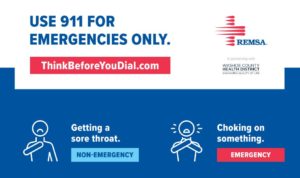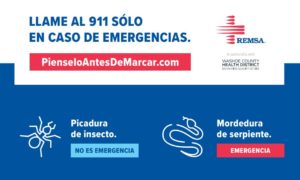Why 9-1-1 Is For Emergencies Only
You might have seen our recent public service campaign, which aims to encourage people to think about what sort of illnesses and injuries require calling 9-1-1 for an immediate, emergency response.


The campaign highlights several examples of injuries and reasons to call 9-1-1 for paramedic-level emergency care. The campaign intentionally juxtaposes some extreme comparisons for the sake of interest, but let’s explore some reasons that would warrant an emergency level of care. They could include chest pain, sudden loss of consciousness, weakness on one side, severe burns, seizure, coughing or vomiting blood, severe allergic reaction, shortness of breath, sudden slurring of words or difficulty speaking, trauma, uncontrolled bleeding, poisoning and severe stomach pain. It is also important to consider if the person’s condition could become life-threatening on the way to the hospital, or if there could be a delay in getting to the hospital or if moving the person could cause further injury. If so, the person needs the skills or equipment of trained paramedics and calling 9-1-1 right away is the appropriate action.
However, REMSA receives 9-1-1 calls every day for conditions that are not emergencies and that can be managed with a different level of care (urgent care versus the emergency room) and a different mode of transportation (personal vehicle versus an ambulance). Examples of these include earaches, sore throats, fevers and persistent cough, sprained, strained or stubbed limbs, fingers or toes, running out of medication, headaches, skin irritations, sunburns or rashes.
The public service campaign is intended to bring awareness to the idea that nearly 20% of all of Washoe County’s emergency medical services (EMS) calls are considered to be low or no acuity – meaning that the person not critically injured nor are they likely to become severely sick. What’s most important to realize is that when an ambulance is responding to a low-acuity call, they are taken out of the EMS system, making that unit unable to respond to life-threatening emergencies like serious motor-vehicle accidents or cardiac arrests. Getting the right level of care not only helps you, but it also helps those in the most need in our community.
In addition to helping the public understand how to distinguish between an emergency and a non-emergency through the public service campaign, REMSA also administers an emergency sorting system when you call 9-1-1. Once an ambulance is on its way to you, if, based on international protocol questions, it is determined that you have a low or no-acuity medical need, REMSA dispatchers will seek your consent to transfer you to a registered nurse within our dispatch center to assist you in seeking the right level of care for your condition. By consenting to this service, you are ensuring that an ambulance and a paramedic are available to respond to the most serious and life-threatening emergencies.
Learn more about this process from Terri Russell’s campaign coverage on KOLO.
For a list of non-emergency phone numbers you can dial when you need help, visit ThinkBeforeYouDial.com.
